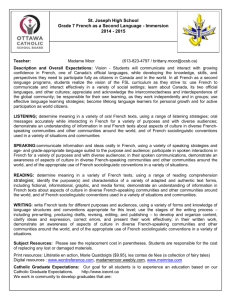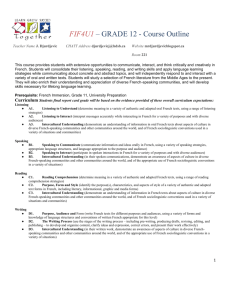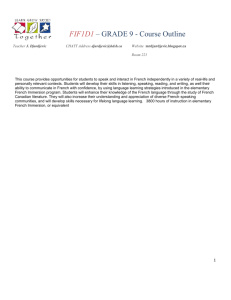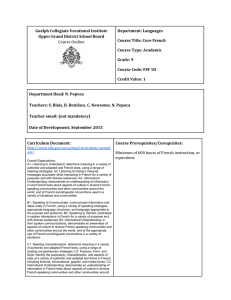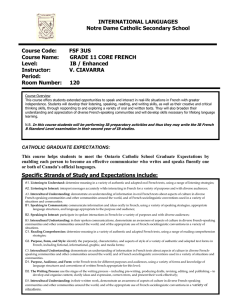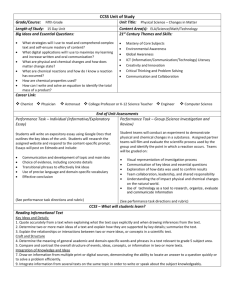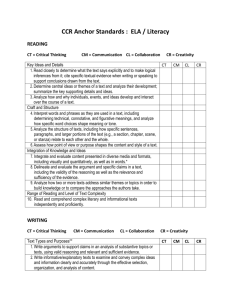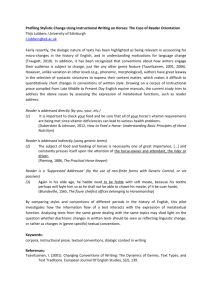Immaculata High School - Madame Moor
advertisement
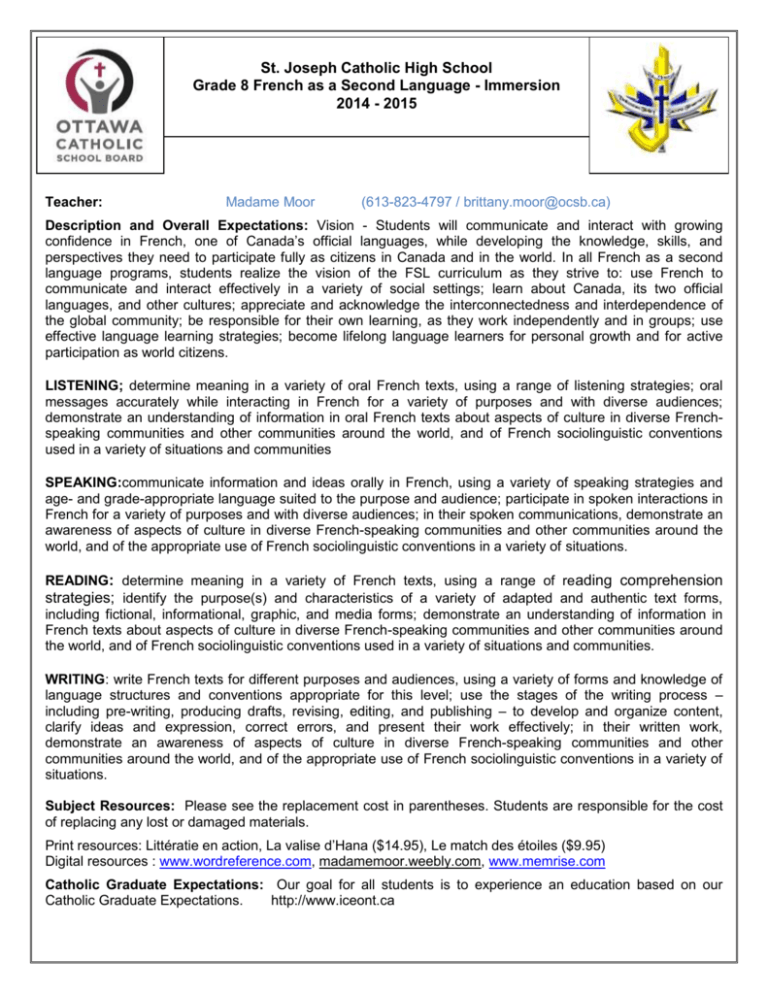
St. Joseph Catholic High School Grade 8 French as a Second Language - Immersion 2014 - 2015 Teacher: Madame Moor (613-823-4797 / brittany.moor@ocsb.ca) Description and Overall Expectations: Vision - Students will communicate and interact with growing confidence in French, one of Canada’s official languages, while developing the knowledge, skills, and perspectives they need to participate fully as citizens in Canada and in the world. In all French as a second language programs, students realize the vision of the FSL curriculum as they strive to: use French to communicate and interact effectively in a variety of social settings; learn about Canada, its two official languages, and other cultures; appreciate and acknowledge the interconnectedness and interdependence of the global community; be responsible for their own learning, as they work independently and in groups; use effective language learning strategies; become lifelong language learners for personal growth and for active participation as world citizens. LISTENING; determine meaning in a variety of oral French texts, using a range of listening strategies; oral messages accurately while interacting in French for a variety of purposes and with diverse audiences; demonstrate an understanding of information in oral French texts about aspects of culture in diverse Frenchspeaking communities and other communities around the world, and of French sociolinguistic conventions used in a variety of situations and communities SPEAKING:communicate information and ideas orally in French, using a variety of speaking strategies and age- and grade-appropriate language suited to the purpose and audience; participate in spoken interactions in French for a variety of purposes and with diverse audiences; in their spoken communications, demonstrate an awareness of aspects of culture in diverse French-speaking communities and other communities around the world, and of the appropriate use of French sociolinguistic conventions in a variety of situations. READING: determine meaning in a variety of French texts, using a range of re ading comprehension strategies; identify the purpose(s) and characteristics of a variety of adapted and authentic text forms, including fictional, informational, graphic, and media forms; demonstrate an understanding of information in French texts about aspects of culture in diverse French-speaking communities and other communities around the world, and of French sociolinguistic conventions used in a variety of situations and communities. WRITING: write French texts for different purposes and audiences, using a variety of forms and knowledge of language structures and conventions appropriate for this level; use the stages of the writing process – including pre-writing, producing drafts, revising, editing, and publishing – to develop and organize content, clarify ideas and expression, correct errors, and present their work effectively; in their written work, demonstrate an awareness of aspects of culture in diverse French-speaking communities and other communities around the world, and of the appropriate use of French sociolinguistic conventions in a variety of situations. Subject Resources: Please see the replacement cost in parentheses. Students are responsible for the cost of replacing any lost or damaged materials. Print resources: Littératie en action, La valise d’Hana ($14.95), Le match des étoiles ($9.95) Digital resources : www.wordreference.com, madamemoor.weebly.com, www.memrise.com Catholic Graduate Expectations: Our goal for all students is to experience an education based on our Catholic Graduate Expectations. http://www.iceont.ca We work in community to develop graduates that are: Discerning Believers Formed in the Catholic Faith Community Effective Communicators Reflective and Creative Thinkers Self-Directed, Responsible, Life-Long Learners Collaborative Contributors Caring Family Members Responsible Citizens Assessment, Evaluation and Reporting: The primary purpose of assessment and evaluation is to improve student learning. Students will understand what is expected of them, using learning goals, and success criteria, based on the overall expectations. Feedback (self, peer, teacher) supports learning, and plays a critical role in academic achievement and success. The development of learning skills and work habits is a key indicator of future success. The following learning skills and work habits will be developed, assessed, and reported during this course: 1. Responsibility fulfills responsibilities and commitments (e.g. accepts and acts on feedback) 2. Organization manages time to complete tasks and achieve goals (e.g. meets goals, on time) 3. Independent work uses class time appropriately to complete tasks (e.g. monitors own learning) 4. Collaboration works with others, promotes critical thinking (e.g. provides feedback to peers) 5. Initiative demonstrates curiosity and an interest in learning (e.g. sets high goals) 6. Self-Regulation sets goals, monitors progress towards achieving goals (e.g. sets, reflects goals) Group work supports collaboration, an important 21st century skill. This will be assessed only as a learning skill. Homework may also be assessed as a learning skill. Evaluation completed in class will be based only on individual student work. Regular attendance is important to support group work, various forms of feedback, and to allow students to demonstrate evidence of their learning. Students are responsible for providing evidence of their own learning in class, within given timelines. Next steps in response to academic integrity issues, such as lack of work completion, plagiarism, or other forms of cheating, range from providing alternate opportunities, to a deduction of marks. The achievement chart identifies four levels, based on achievement of the overall expectations: Level 1 achievement falls below the provincial standard (50-59%) Level 2 achievement approaches the provincial standard (60-69%) Level 3 achievement is at the provincial standard (70-79%) Level 4 achievement surpasses the provincial standard (80-100%) Reporting on Student Learning: Student learning will include a variety of assessment tasks designed to demonstrate students’ development in their knowledge and understanding, thinking, communication and application of all overall expectations. The fall progress report gives feedback on learning skills (i.e. needs improvement, satisfactory, good or excellent) and emerging student achievement (i.e. progressing with difficulty, progressing well, progressing very well) The report card grade will be based on evidence of student learning, including observations, conversations and student products. Consideration will be given to more recent evidence (skill development) and the most consistent level of achievement. Student and Parent/Guardian Acknowledgement We have read the above course outline and are aware of the student responsibilities to attend class on a regular basis and to provide evidence of learning within the established timelines. Student's Name (print): _______________________ Student's Signature: ____________________________ Parent/Guardian Name (print):_________________Parent/Guardian Signature: ________________________
